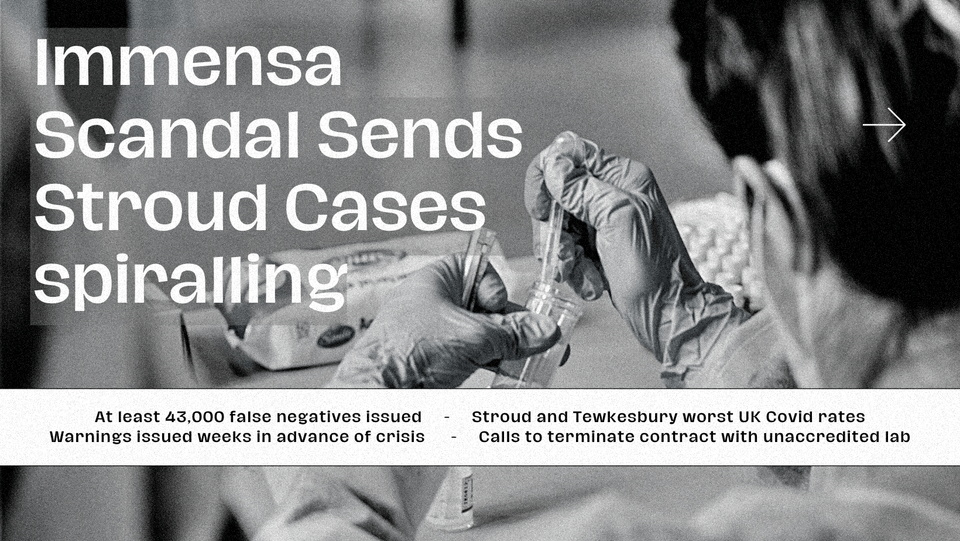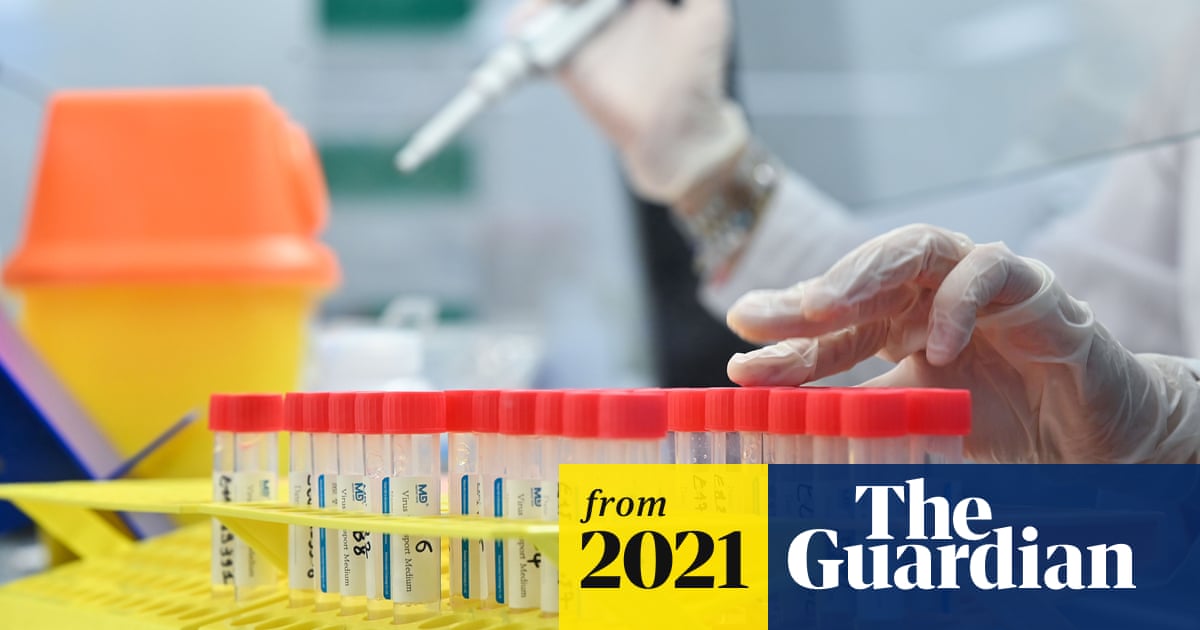Scandal over COVID testing failure grows as Stroud rates spiralling

What went wrong, why were warnings ignored and where does the buck stop?
By Jamie O’Dell
Local political leaders from the rainbow alliance running Stroud District Council (SDC) have called for the government to urgently introduce measures to bring down Covid rates as it emerges that Stroud is one of the most affected areas of the country from the Covid testing failures. Serious questions are therefore being asked as to how an estimated 43,000 people were given false negative test results by a private testing lab run by a company named Immensa.

Covid rates in Gloucestershire are at almost double the national average, with Stroud and Tewkesbury having the two highest Covid rates in the Country. As of October 25th, the 7-day average of people testing positive was 807 people per 100,000 in Gloucestershire and 889 people per 100,000 in Stroud. The average across England being 448 per 100,000. We have also seen an increase in hospitalisations following this, with hospitalisations in the 7 days before the 19th of October being 43% of the worst period in January 2021, with the rate in the rest of England being 21% of the January peak. With this in mind, the table below demonstrates the scale of impact these testing failures have had upon Covid rates in the most affected areas like Stroud.

Questions are also being asked as to why, despite the alarm being raised by both local residents and volunteer organisers from the Stroud Coronavirus Community Response (SCCR) team, it took the relevant authorities so long to recognise the issue, take action and inform those who may have been affected.
To exemplify the scale of this inaction, James Beecher of SCCR has described how, following a steep decline in positive test results locally on the 18th September, he identified that ‘a problem at a testing lab may be involved’. Beecher subsequently contacted Test and Trace on September 30th to raise SCCR’s concerns. However, despite being an officially recognised Covid Community Leader, no concrete answers were provided to him for over two weeks. Testing at the Immensa lab was not fixed until October 12th, and there was no public statement on the failures – which would have been helpful for the people across Stroud and elsewhere who’d received false negative PCR test results – until October 15th.
It is stunning that this critical failure was spotted first by locals analysing government data, yet missed and then ignored by authorities for nearly six weeks before any action was taken or public acknowledgement given. SDC leaders are now demanding information on why it took so long, after so many thousands of people were affected, to identify and fix this issue. Shockingly, The Independent have reported that employees at the Immensa lab had attempted to raise their concerns over working conditions, quality control measures and a prioritisation of “quantity over quality”, but these were allegedly dismissed by senior management officials.
It has also emerged that Immensa was never fully accredited to carry out tests, despite insistence from the government that it was, as its £119 million contract signed last September did not go through the normal tendering process. Despite this, on the 26th of October it emerged that Immensa was still being allowed to process people’s PCR tests for travel.
Alan McNally, a professor who helped set up the Lighthouse testing lab at Milton Keynes, was quoted in the Guardian as saying this ranked ‘pretty near the top’ of the long list of Covid failures and scandals, stating that ‘you shouldn’t be relying on anecdotal reports to spot a problem of this size.’
This speaks to the continued favouring and failures of the private sector throughout the UK’s pandemic response and just why profit and public health should not be mixed. The focus of Immensa bosses on output over standards being testament to why profit motive should not be allowed into our healthcare system. We’ve seen this right from the start of the pandemic, and we are seeing it yet again here as a continuation of the government’s 11 year drive to expand the private sector in the running of the NHS and social care.
One example of this is Stroud’s own Steve Dechan, whose small, loss-making company won millions in government PPE contracts, only for much of the PPE delivered to be left unused due to not meeting required standards. This left the government paying £423 per face shield after only 274,200 out of the 120 million ordered were used.
The true human impact of these failures is painfully apparent in the personal stories that have been provided to SCCR. These include Mel Brown, whose husband faces months of physical and mental recovery following two weeks in hospital after their son was given a false negative test, and Gayle Simpson, who spent four days in hospital after their son also received a false negative. These are just two examples of the many people across Stroud who had symptoms, had positive lateral flow tests, and yet still went into work, to school, saw friends and family and/or weren’t able to access self-isolation support payments because they received negative PCR tests and were told they didn’t need to self-isolate.
Judging by the continued silence and inaction from the government, calls for accountability and learning appear to be falling upon deaf ears. The Prime Minister’s spokesman has said that ‘they have seen there was a lab error’ but ‘don’t believe that accounts for the increases we have seen [in the south west]’. This, alongside the ‘apology for any inconvenience’ given to those who have received false negatives, has been justifiably described by Beecher as ‘insulting’.
It cannot be stressed enough that this is one of the biggest failures of the UK’s test and trace system. Stroud has been positioned at its heart and left with some of the highest rates of Covid infections in the country. With the continued lack of accountability and responsibility from those responsible and those in power, it is impossible to avoid the feeling that Stroud is being hung out to dry.
This is why, alongside taking precautions to slow the spread of the virus, we need to continue to demand answers from those who represent us. This starts with Stroud MP Siobhan Baillie – who can question government ministers directly but has said little on this matter so far – and ends with the Health Secretary Sajid Javid, as well as those consistently allowing the private sector to wreak havoc upon our health system.
Our thanks go to James Beecher and the Stroud Community Coronavirus Response team, not just for their work in exposing and reacting to this scandal and supporting the writing of this piece, but also for the support they have provided Stroud residents right from the start of the pandemic. You can read James’s article for OpenDemocracy on this story, as well as SCCR’s most recent data summary


Member discussion